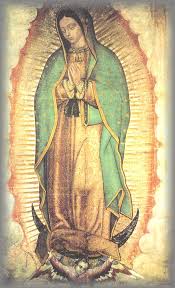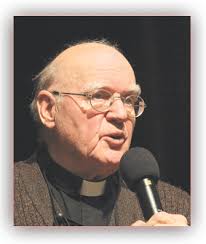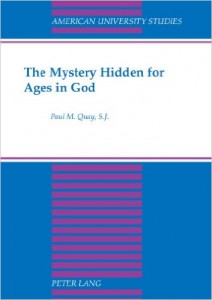 On his recent visit to our college this summer, the Jesuit scholar Father Koterski mentioned a book that he described as the ‘most influential he has ever read’, his fellow Jesuit’s Father Paul Quay’s “The Mystery Hidden for Ages in God”. Upon his effusive recommendation, I made a resolve to read the book, and this article, adapted from a talk I recently offered, is my attempt to describe its contents and mission.
On his recent visit to our college this summer, the Jesuit scholar Father Koterski mentioned a book that he described as the ‘most influential he has ever read’, his fellow Jesuit’s Father Paul Quay’s “The Mystery Hidden for Ages in God”. Upon his effusive recommendation, I made a resolve to read the book, and this article, adapted from a talk I recently offered, is my attempt to describe its contents and mission.
True to his word, the book is, amongst many adjectives one could bring to bear, influential. It is also erudite, broad, comprehensive, insightful, systematic, and, yes, from a Jesuit, highly orthodox. I found myself agreeing almost all the way through, perhaps not agreeing with all, but with most.
I must confess that it is difficult in such a summary to know what to leave out. Father Quay’s book is 425 pages long, with small print, lots of footnotes, and dense prose. Some bits are difficult going, other quite easy and readable, but all of it theologically, philosophically and culturally rich.
Father Quay’s first and basic provocative question guides his discussion: As he puts it:
This book took its origin from a question put to me back in the mid-50’s by a friend I’d first come to know in Fiji during the Second World War”. The friend’s name was Alfred Shatkin, a Jewish, but “firmly and non-believing ahteist”. Anyway after the war, Father Quay met Alfred, and taking a stroll, they sat down on a bench, and Alfred told the good Jesuit of a “Catholic who lived in his apartment building, a man apparently devout and in good standing with the Church, who went to Mass every Sunday, but who was well known in the building for beating his wife mercilessly” (this was in the bad old days where such things were swept under the rug, and still are, Ed.) “and otherwise proving himself a very immoral man, whether by my standards or by Alfred’s. So Alfred asked me (and here is the essential point): “With all the gifts from God that Catholics supposedly have, how is it that they are frequently worse in their morals, or only indistinguishably better, then us atheists?
A provocative question indeed, and one that stayed with Father Quay, as he admits, for the rest of his priestly ministry. So resulted the book, first published in 1995. Another great Jesuit (yes, there are still great Jesuits!), Father John Hardon, called Father Quay one of the most brilliant students he had ever taught in the Jesuit theologate, and this book bears witness to his brilliance. I cannot do the book justice in these brief moments, and hope only to tantalize you to read it for yourselves.
Here are two quotations from The Mystery Hidden For Ages in God, an ambiguous title as we will see with a double entendre, that Father Hardon found the most provocative:
First, concerning our own spiritual personal spiritual development:
Why should spiritual growth, my own and others’, be so slow? Why do some priests or religious seem to go backwards rather than forwards? Why do many Catholics, even priests and religious, seem to lack the close personal relationship with Jesus Christ that is so visibly operative in the lives of many believing Protestants despite the greater spiritual opportunities given the Catholics? After Vatican II, why did so many priests and religious leave their consecrated life to live as laymen—or even abandon the Church altogether—and this, after many reasonably productive and apparently contented years under their vows? Why are Christians often more easily led into moral evil by the surrounding culture than are, say, Orthodox Jews? Again, all these are simple variants on the basic question: how should Christians grow spiritually, how do they, and why the difference?
And, second, we the apparent absence of the effects of the Church, with a rather scandalous rise of evil:
Our century has been drowned in blood: the hundreds of millions of infants aborted; the far fewer, though still many millions, slain by Stalin, Mao, Hitler, and Pol Pot; the other millions killed in the two World Wars and the swarm of lesser conflicts; to say nothing of the victims of the internal collapse of family life and its replacement with gang life, drugs, and ‘virtual reality.’ The sight of a Christianity seemingly no more powerful to save from such evils than have scientific progress, the achievements of technology, and philosophical argument together. The question, “When confronted by such evils, where is Christianity and its vaunted power to change the hearts of men?” is answered quickly by “Nowhere” or “Collaborating with the evildoers.” But what is nowhere is discarded as nonexistent; what collaborates with evildoers is fought aggressively in order to destroy it. Hence, the current mixture of indifference and hostility.
Ah, so indeed. Why are Catholics not holier than they are, and why the Church not more influential? Why are we so mediocre? Why, even worse, have Catholics, as a body, adopted the culture of sin and death at the same rate, by and large, as the rest of the world? Given that Christ founded a Church with all the salvific truth, all the means of holiness in her doctrine and teaching, the Virgin Mary and all the saints as intercessors and exemplars, the Eucharist and the sacraments, why are we not better than we are?
Of course, the second depends on the first. If Catholics, and Christians, were holier, would such evils have been prevented, or at least attenuated? We may think of the warning of Our Lady of Fatima during the dark days of the First World War, that unless mankind repented, an even greater war, and greater evils, would be unleashed upon the world.
But all is not bleak! For Father Quay diagnoses what he considers the central problem, and offers an answer, or a series of answers, which he summarizes in the first chapter of the book, then spends his 400-plus, explaining. It took me a while to read this tome, but it was worth it, and one of the few great books that I would consider rereading more than once.
The book is divided into three main sections, with numbers subdivisions, sort of like the Summa. Indeed, the book has a strong Thomistic element throughout, as any good theology should, although also like any good theology, Father Quay’s thoughts go beyond Thomas, or, at least, apply his thought ot the problems that now plague and our world.
These three divisions, are: Part I, Adam and Christ: Original Sin. Part II, Recapitulation in Christ. And Part III, The Church, the New Israel.
They follow upon the principal problems as Father Quay sees it, which are a sundering of Christian thought and life, and a consequent loss of living the faith, especially as found in Scripture. Our faith, he believes, has become by and large a dried husk, an outer shell that means little, and is eventually cast off like the dead skin of a molting lizard (the analogies are mine).
Father Quay, following the great 3rd century theologian-martyr Saint Irenaeus, sees the solution in what he terms recapitulation:
If we are to live in Christ, we must live in Him in accord with the pattern of His own life, a pattern it will be our concern to sketch out an develop…In its strongest form, recapitulation names a process intended to shape the entire life of the Christian:
And here he adds the following in boldface:
God intends that, through the action of His grace, each Christian,
- a) relive in Christ, during the first portion of his life, all that God led His people through from the fall of Adam to Christ’s death and resurrection
- b) thereafter, live as son of God in Christ in the full freedom of the Holy Spirit, so as to glorify the Father in the Church by making Him known to all men through the Spirit’s power.
As Father Paul sees it, most people, Catholic and otherwise, do not go through the first stage, and, hence, never reach the second, sons of God and true disciples of Christ, as much as they may think they do. We refuse to ‘put off the old man’ so as to ‘put on the new’. This is a long, laborious, personal, relational process, and there is no quick formula or fix, there is not brief set of ‘rules’, there is, as G.K. Chesterton warned, no ‘efficient’ way to do this.
It is Father Quay’s contention that to become ‘like Christ’ we must live through, recapitulate, the Old Testament journey, from Adam to Christ, and only then begin the New Testament journey. For grace builds on nature, and our ‘natural man’ must be perfected before we put on the ‘supernatural’.
One of the names that recurs through the book is Marcion, whose early second-century heresy (he died in 165 A.D.) has really affected and infected all subsequent heresies. He may be described as the first theological Church bureaucrat, obsessed, we might now say, with such ‘efficiency’. It was he who wondered, why do we need the Old Testament, with all of its outmoded laws, its archaic language, its barbaric practices? (This would also bother Saint Augustine 200 years later). Again, Father Quay:
If the New Testament contains the fulfilment of the Old, if we have in Christ Jesus and His Church all that we need for salvation, why must we keep the Old Testament? Excessively long, often barbarous in language and concept, frequently repetitive and dull, was it not clearly obsolete, even for Jews, after the destruction of Jerusalem and the Temple? What good can the Old Testament serve, at least for the Christian? (p. 146)
So Marcion chucked it, along with most of what he considered the ‘too Jewish’ New Testament bits, leaving a truncated Gospel of Luke and ten letters of Saint Paul, the strictly ‘New Covenant’ or Catholic elements. The end point of such an efficient, one might say bureaucratic, view of religion is to reduce holiness and the imitation of Christ to a system, a technique, a set of rules, prescriptions and proscriptions. One might well ask, why the Bible at all?
Father Quay responds:
The Church’s response was firm and direct. The Old Testament was to be kept, first and foremost, because it ist he inspired Word of God, as proved by the use made of it throughout the New Testament.
But more: Because it is only by living out the true spiritual sense of Scripture that we can truly follow Christ and achieve holiness”.
I often ask my students as a thought experiment, if you could bring only two books to a desert island (or, more realistically, to a week-longretreat, about the same thing), which would you bring, the Catechism of the Catholic Church, or the Bible?
The answers are curious, but even in first year, most say the Bible, and they are likely correct. For, sad as it is for me to say it, most people learn much more from stories than from doctrine, and, later in the book, Father Quay laments that the post-mediaeval over-analysis of holiness in terms of philosophical categories, virtues and vices, act, potency, illuminative, unitive way, tended to restrict holiness to educated monks, nuns and priests, and left the laity to hunt, fish and procreate.
For holiness is not about what you do or don’t do, but rather, about who you are, or, more properly, who you become. And we only become like Christ by recapitulating, in a spiritual sense, all that the Jews, and in a sacramental way Christ Himself, went through on the journey to full holiness.
There is so much in this book, as it covers more or less the whole of theology, from the inner life of the Trinity (the source and exemplar of all other life, especially human), the history of the Old and New Testament, the status and consciousness of Christ in His humanity, the Fathers, the Church, young and recent, culture, the university.
Here are some principal elements that really struck me, amongst many:
We must begin with a proper reading of the Bible. Father Quay argues that our age, insofar as we read or think of the Word of God at all, has become obsessed with the historical-critical method, and the ‘sense’ of Scripture that this gives. But the Bible was not written primarily to teach us how 5th century BC people in Palestine lived. Rather, the ultimate purpose of God in giving us Scripture is that we might live out the true spiritual sense, especially as this sense points to Christ, and our preparation to follow Him.
We must recapture and live out the true spiritual, particularly the typological, sense of the Bible, which Father Quay defines as “the meaning God has given the realities spoken of by the biblical text, all which realities look forward to Christ”. (p. 164)
How do get this spiritual sense of Scripture? Father Quay says we must return to the Patristic sources, largely dismissed by ‘Scripture scholars’ as pietistic and irrelevant. But it is the Fathers who in reality, and in their proximity to the Apostolic Tradition, witness to the true meaning of Scripture as God intended, as pointing to Christ, His Church, and our holiness.
There is much that Father Quay draws from this proper reading of Scripture, and the evil fruits of misreading or neglecting the Word of God.
One of the key and fundamental elements that Scripture offers is a grasp of the full reality of original sin, and what we lost by giving up that state we call ‘original justice’. The effects of the sin passed down to us from Adam can only be realized by seeing its effects in history, and in individuals, through Scripture. Father Quay argues that each human being must live through these effects, from our conception onwards, and fight against its baneful tendencies by grace and free will. In his words, original sin foments, even at the beginning of our lives, leads to a “desire for a value that is entirely one’s own (that) is insatiable. It can find no surcease till, impossibly, the infant is satisfied that the goodness of his own small self is great enough to coerce the love that is necessary for his survival” (p. 127).
It is “desire that a free person’s love for oneself be necessitated by one’s own excellence is to desire what belongs to God alone”, and this is the key hallmark of original sin, manifested in all its evil consequences. We seek to coerce love and acceptance, however subtly, rather than receive the love of God, and in turn give it freely, that is produces the evil in the world.
The consequence of this denial of original sin, and sin in general, and the refusal to recapitulate what is necessary to remedy this evil, is the moral and spiritual regression of our culture and individuals therein. This has resulted in what Father Quay provocatively calls the “emasculation of Western Christendom”, and I agree with him that this is one of the most important. The roots of this emasculation go all the way back to Adam. Here is Father Quay’s description of Adam’s sin, which I will begin after Adam realizes his beloved wife had sinned and rebelled against God:
Adam, still in the state of integrity, is confronted with Eve, bearing one piece of the forbidden fruit, a bite already taken out of it…all that Adam held dear – except the LORD – was being torn away by the one fact that she had fallen and he had not.
Because there was in him no concupiscence, her continuing physical beauty and personal charm did nothing to cover or hide the evil thing that she made herself by her defiance of the LORD’s command. He saw clearly that he was obliged to refuse her offer and, so, lose her through death and, during what life she might still have, endure her contemptuous loathing and mocking hatred of him for his refusal to join her. The fruit that she offered him…was ‘to be as God’, deciding for himself as sole arbiter and without reference to any other will, what should be known as good and what as evil. Thus was set before him concretely the question that must come to every man: Whose will shall I follow, God’s or my own, when it seems that the two are at odds?” (p. 265).
As we know, “Adam chose to join his wife, to descend to her state, rather than to obey the LORD in faith. He would not “hope against hope” that God might somehow, through Adam’s own suffering and intercession, lift her again into spiritual life and bring her back”.
As Father Quay concludes, “To understand more fully the evil involved, we need to understand what God had intended from the beginning for husband and wife. For this we must turn to the Second Adam and His bride. For it was on the cross, where the Church has always seen the action that undid the sin of Adam and its consequences, that Jesus showed us what God had meant a husband to be”
At least one large element of Adam’s sin, present generations later in the tragic figure of King Saul, was to be a ‘wimp’, a term which the great psychologist Paul Vitz defines as a “man whose primary psychological desire is to be liked” (p. 277). When I read this, I was struck by how often I have been a ‘wimp’, to dire consequences.
It is this breakdown in masculinity, rooted in a denial of the Old Testament recapitulation, that Father Quay sees as the root of our modern evils. For true authority, represented in the man, resides in the capacity to endure suffering for others, like Christ, rather than inflict suffering.
This misunderstanding and misuse of authority led to the future schisms in the Church, as men developed their own ‘egos’, the common element of which is the “breaking of the communal bonds of the Church’s traditional understanding of divine revelation”, especially in the realm of the family (the emasculation of the father) and the local Church (the emasculation of the priest, the spiritual father). The ‘desire to please’, when it does not work, results in some level of ‘coercion to please’, to force love and, if not love, at least obedience.
This petulant ‘coercion’ can work in children, who are cute, but not in grown men, who are not so cute.
The last bit of Father Quay’s work may be summarized in modern man’s incapacity and unwillingness to endure suffering for the sake of others, the mark of true paternal, and God-like, authority. Rather, man seeks to impose his authority, even on God and His Church.
As he says “The Reformation appears as a sort of final despair in the face of the seriously irresponsible and sinful behaviour of many of the Church’s members, especially those in the highest offices. Precisely, however, as such it represented an abdication of Christ’s mode of responsibility for her whom He had had to redeem for Himself by death upon the cross. The Reformers indeed refused longer to accept any responsibility for her. She was branded the Great Harlot, the Whore of Babylon, who once had been Christ’s Bride, but who had defiled herself beyond recognition” (p. 406).
At least the Reformers remained rooted in the Old Testament, however misunderstood, which is why they maintain in many ways, like the Hasidic Jews, more ‘masculine’ customs than many modern Catholics, who are adrift from the foundations of their Faith.
The end point of this is that modern man seeks to remove himself from all bonds, all those things that may ask for his commitment to himself or to others, with the suffering this might entail. Hence we see a paradoxical flight from the feminine, from anything that might tie him down, or ask for his spiritual growth. Again, Father Quay:
“By accepting responsibility for a wife, a man accepts a risk of failing as well as an opportunity – but also an obligation – to mature yet more through the exercise of his powers in new and fuller ways. All this requires a loosening of the grip of his own spontaneous desires and an uncentering of his choices from his own preferences” (p. 410)
In other words, such responsibility (whether in marriage, or the spiritual marriage of consecrated life), a man finds a remedy for the egocentric effects of original sin.
Father Quay argues that this is also why men flee from the Church which is the spiritual feminine image, the Bride of Christ, which demands things of us, even to the point of ‘laying down our lives’. But most men cannot even get out of bed.
That is why in modern man “there has been a movement to mere use of all that is receptive, concrete or feminine, along with concomitant contempt for what is so used. Women themselves have been increasingly despised, though unconsciously feared or resented” (p. 411).
What has resulted is a distortion in masculinity, from the metro or homo-sexual ‘wimp’, desiring to be please, to the domineering and excessively abstract “macho” man seeking heterosexual conquest (like Jason Derulo or Snoop Dogg), or, I might add, fantasizing over imagined conquests in his parents’ basement.
Again, Father Quay:
“A good percentage of the college-trained Christians in this country (the U.S.!) along with many of their clergy, have been among the most visibly affected by that moral softness, one that is rotting away observance even of the Commandments” (p. 419).
This is not a new phenomena, but the culmination of hundreds of years of post-mediaeval breakdown in Christendom:
“Over the last six centuries, then, the husband who sought to symbolize in his marriage something of Christ’s relations with His Church has become in succession the earth-bound husband and father, the macho mate who provides sustenance but whose life is centred elsewhere, the paramour, the philanderer and (yes) the wimp. Psychologically, the process was, as Vitz describes it, the gradual setting loose in the world of the totally autonomous ego” (p. 411).
The tragedy of feminism is, he argues, in fact a reaction against this loss of masculine authority, and not against masculinity itself, which many women in a world far advanced in ‘wimpdom’, have never really experienced. At a deep level, perhaps of which they are unaware, the feminist reacts against the feminine a “self-directed anger, roused by some sense of internal connivance with the men at whom the anger and the disgust are directed”. The women are fleeing from the feminine because of the men.
Father Quay: “The demand for autonomy is the self-contradictory demand for an absolute masculinity, a non-relational and sterile mimicry of the Father in Satan’s scoffing manner” (ibid.).
Lest we consider ourselves immune from such a malady of the autonomous ego and consequent masculine failure, Father Quay also has harsh words for academia, which has seen an ever-greater substitution of intellectual achievement for integral recapitulation. Theology has transformed from something lived, as a means to holiness, to just another subject matter, with degrees, honours, awards (insofar as the subject of theology still exists at all on many campuses). Universities, born from the ‘heart of the Church’, as Pope Saint John Paul described, originally included the “formative and developmental aspects of learning…as essential to the attainment of Christian wisdom”. From almost the beginning “this began gradually to weaken…replaced by the practical knowledge directed to the instruction of professionals”. In the era soon after Saint Thomas Aquinas, “a century and a half before and during the Reformation, scholastic theology was severely criticized for being nothing but book learning like the philosophy that had become its vehicle”. (p. 399) Alas, “even Thomas seems not to have grasped explicitly the central role of recapitulation in Christ for the Christian life”. (p.400).
As he goes on “With the displacement of the cathedral schools by the universities in the 12th century, the formative and the developmental aspects of learning, included as essential in the attainment of Christian wisdom, began gradually to weaken…Thus the universities brought to birth the professional, intellectual classes, lay and clerical, that have the dominant role in shaping Western culture ever since”. Hence, our modern scientists and politicians, running the world. But the Vatican II Constitution Gaudium et Spes warned that the “the world stands in peril unless wiser men be forthcoming”.
We refuse to apply what we learn to ourselves, for all learning should ultimately lead to our own perfection, which we in turn hand on to others, so that goodness and holiness may increase. But this, alas, requires some degree of suffering.
The solution? We go back to the beginning, to recapitulate, to re-live and re-experience in a spiritual, symbolic way, the spiritual growth of the people of Israel, from their ‘childhood’ in Abraham, to their ‘adolescence’ during Moses, to their full fulfilment in Christ. As Father Quay so concretely puts it, a youngster cannot be raised on “John 13-17”, as sublime as this discourse is, for it cannot be understood, much less lived, without its roots in the Old Testament. The end point of this is sentimentality, a soft comfortable religion that demands nothing of us; soon, the faith is outright lost. One of Father Quay’s last sentences is that we must rediscover what it is that makes the Old Testament a Christian book.
I said one of his last sentences, for his very last section ends on hope, and he quotes a fellow Jesuit, in fact the very first Jesuit priest, Bd. Pierre Favre (ordained even before their founder, Saint Ignatius), who indicated in his spiritual journal: “Discouragement can come from failing to notice all the little green shoots springing up under the dead and decaying leaves” (p. 420).
As Father Quay points out, “Even in the decadent West, the Church is still growing, putting out new twigs and buds, some flowers and fruits, even if at times somewhat shriveled”. On his second-last page, he quotes the psychiatrist-neurologist, and Jewish convert to Catholicism, Karl Stern:
“The Catholic Church is the church of the multitude. Consequently the outsider, approaching her, faces a thick layer of mediocrity…Thus, it took us some time before we saw the immense hidden treasure of anonymous sanctity in the Church; the spiritual power that flows to and from thousands of souls every day. The stream of sacrifices made, for supernatural motives, by a multitude of working-class people, by religious in their communities, by priests and lay-people alike…”
Sadly, as Stern concludes, like the Jewish people “the misdeeds of one member are more broadcast than the sanctity of a hundred others” (p. 424).
In the end, as Father Quay himself ends up, “the problem of evil, then, is the problem of love”, and “most of us do not realize how deficient we are in love for each other or for God…It is that we might be saved from the hell of an eternal refusal of (God’s) love that we must suffer and grow – and, thus, that we might ratify, by our own free choice, our being made in the Image and Likeness of that eternal love for whom we were created from the beginning”.
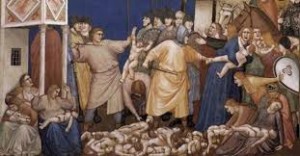 Marc Bauerlein has an insightful essay on false innocence in the recent issue of First Things, describing those who feign an innocence that, perhaps at some level they think they have, but, deeper down, in their heart of hearts, in that still, small voice of conscience I alluded to in my last post, they know they do not.
Marc Bauerlein has an insightful essay on false innocence in the recent issue of First Things, describing those who feign an innocence that, perhaps at some level they think they have, but, deeper down, in their heart of hearts, in that still, small voice of conscience I alluded to in my last post, they know they do not.
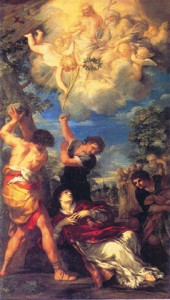


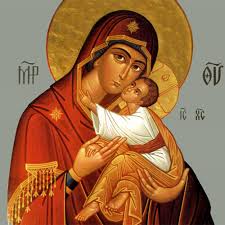
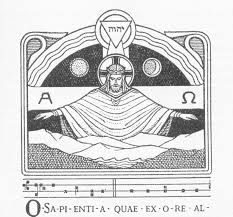
 The photo op of Justin Trudeau and Kathleen Wynne welcoming Syrian refugees at Pearson airport warmed the cockles of many hearts. There was Prime Minister Trudeau, offering a parka to one poor soul stepping off the plane, stating the obvious that ‘it gets cold in Canada’. No kidding, eh? And the current refugees are being spared the worst of it, with this bizarrely, but welcome, warm winter, due, one may suppose, to El Nino. But who could have predicted that? Not the climatologists, pray tell? I have this notion that when January hits, some of the more restless refugees may make a run for the border. I may join them. California looks pretty good when its minus 40.
The photo op of Justin Trudeau and Kathleen Wynne welcoming Syrian refugees at Pearson airport warmed the cockles of many hearts. There was Prime Minister Trudeau, offering a parka to one poor soul stepping off the plane, stating the obvious that ‘it gets cold in Canada’. No kidding, eh? And the current refugees are being spared the worst of it, with this bizarrely, but welcome, warm winter, due, one may suppose, to El Nino. But who could have predicted that? Not the climatologists, pray tell? I have this notion that when January hits, some of the more restless refugees may make a run for the border. I may join them. California looks pretty good when its minus 40. Tonight, Donald Trump joins his fellow Republican presidential hopefuls in debate. Trump gets the centre podium, since he is the front runner and, one may presume, will be the preferred target of the debaters. I wonder if they wonder why he is in front? Has he tapped into a huge demographic of America that feels disenfranchised? That seems a no-brainer. He also says what he thinks, instead of calculating every word for its vote-potential or, worse, its political correctness quotient. People are fed up with cronyism and opportunism, political obfuscation, and, yes, are hungry for the truth. Whether Donald Trump can offer it, is indeed a matter of debate, but he seems on the whole more grounded in reality than the others who, like Sam Gamgee, fear even one little footstep outside the boundary of the politically-safe precintcts of the shire. Even Trump’s more whopping comments have a ring of truth that one does not see much in other political leaders, would-be or current.
Tonight, Donald Trump joins his fellow Republican presidential hopefuls in debate. Trump gets the centre podium, since he is the front runner and, one may presume, will be the preferred target of the debaters. I wonder if they wonder why he is in front? Has he tapped into a huge demographic of America that feels disenfranchised? That seems a no-brainer. He also says what he thinks, instead of calculating every word for its vote-potential or, worse, its political correctness quotient. People are fed up with cronyism and opportunism, political obfuscation, and, yes, are hungry for the truth. Whether Donald Trump can offer it, is indeed a matter of debate, but he seems on the whole more grounded in reality than the others who, like Sam Gamgee, fear even one little footstep outside the boundary of the politically-safe precintcts of the shire. Even Trump’s more whopping comments have a ring of truth that one does not see much in other political leaders, would-be or current.